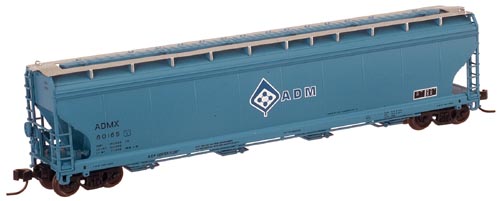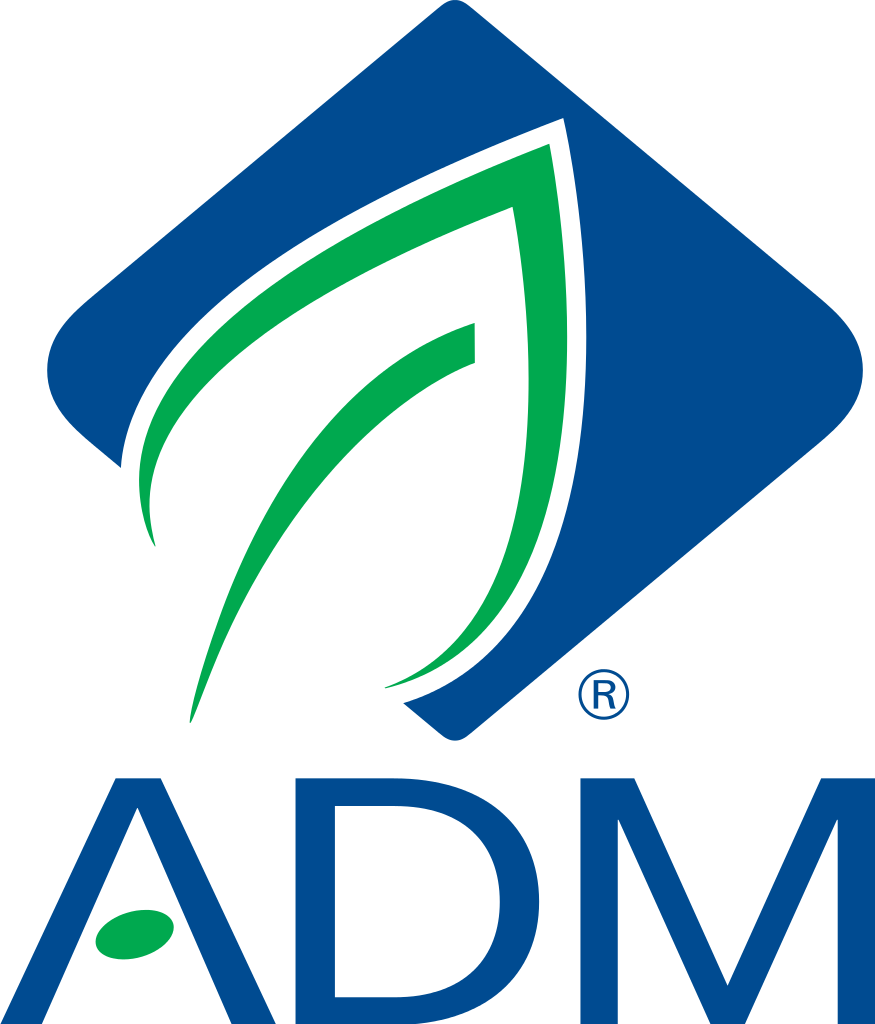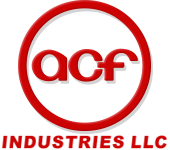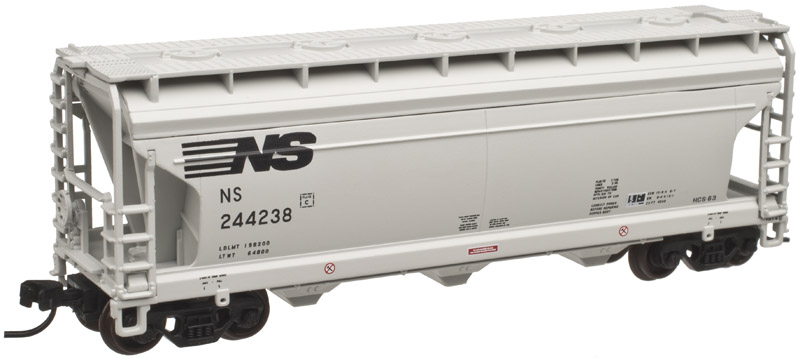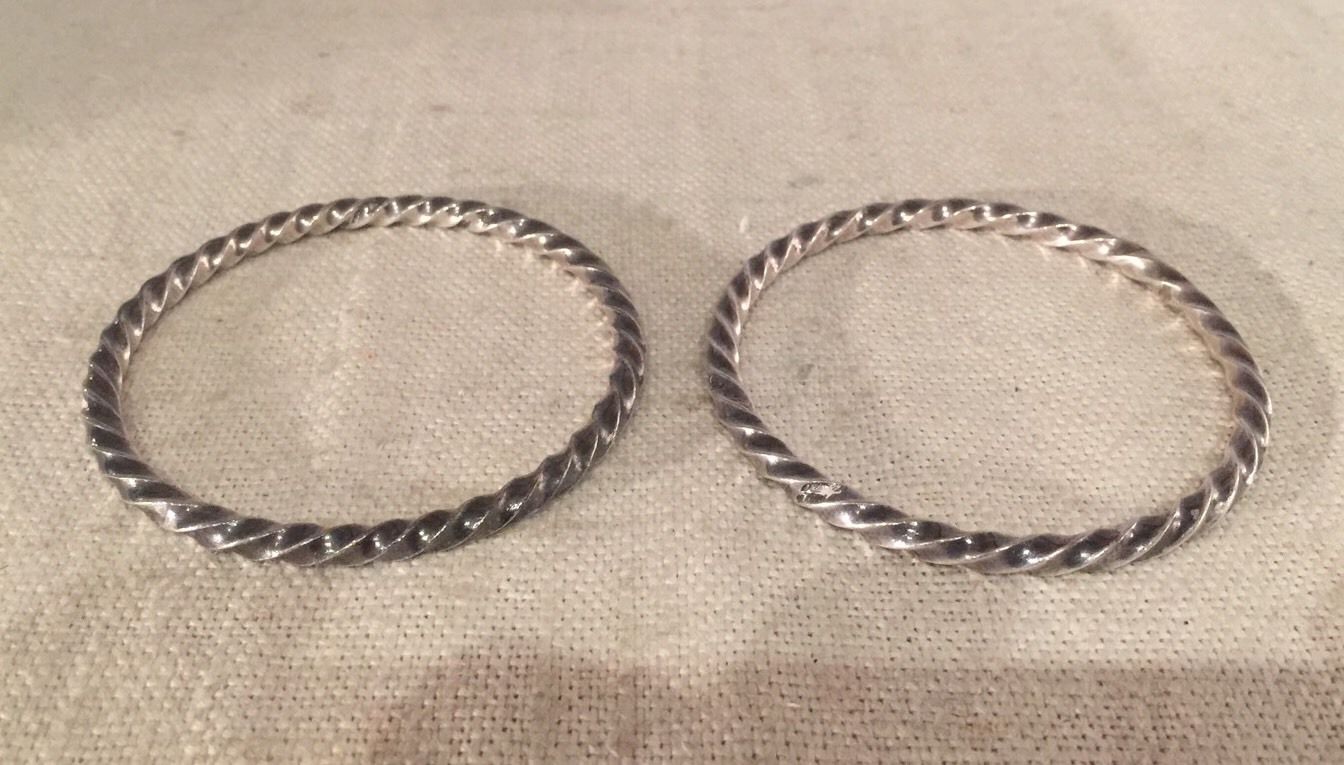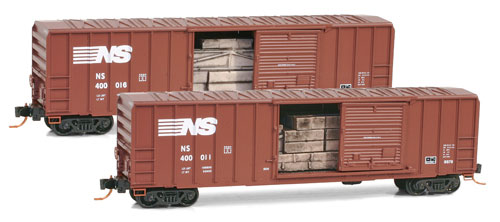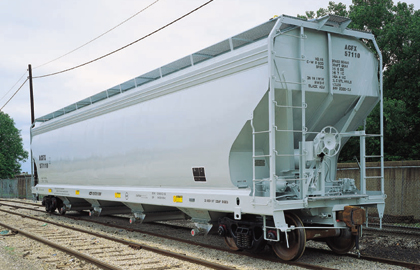Prototype History: Contemporary 2-bay covered hoppers, like ACF's Centerflows, were 100-ton cars designed to haul dense loads, like cement. Their larger 3 and 4-bay brethren, while usually still having 100 ton capacities, were designed for lighter-density loads, like grain or flour. Their sizes had to do with the fact that a low-density product like grain will "cube out" the cubic capacity of a smaller 2-bay car way before you hit the cars' tonnage rating. Conversely, load a 3 or 4-bay covered hopper to its cubic maximum with a dense product like cement, and you'll wind up with a seriously overloaded car tonnage wise. In short, keep the smaller 2-bay cars for heavy commodities, and keep the larger cars for lighter loads like grains, sugar, flour, etc.
Road Name History: As the world's population grows, so does demand for quality foods, feed ingredients for livestock, alternative fuels, and environmentally friendly alternatives to traditional chemicals. As one of the world's leading agricultural processors, ADM plays a pivotal role in meeting all of these needs.
ADM produces the food ingredients, animal feeds and feed ingredients, biofuels and other products that manufacturers around the world use to provide wholesome food and a better life to millions of people around the globe.
From the ADM Website
ADM produces the food ingredients, animal feeds and feed ingredients, biofuels and other products that manufacturers around the world use to provide wholesome food and a better life to millions of people around the globe.
From the ADM Website
Brand/Importer Information: In 1924 Stephan Schaffan, Sr. founded the Atlas Tool Company in Newark, New Jersey. In 1933 his son, Stephan Schaffan, Jr., came to work for his father at the age of sixteen. Steve Jr. built model airplanes as a hobby and frequented a local hobby shop. Being an enterprising young man, he would often ask the owner if there was anything he could do to earn some extra spending money. Tired of listening to his requests, the hobby-store owner threw some model railroad track parts his way and said, "Here, see if you can improve on this".
In those days, railroad modelers had to assemble and build everything from scratch. Steve Jr. created a "switch kit" which sold so well, that the entire family worked on them in the basement at night, while doing business as usual in the machine shop during the day.
Subsequently, Steve Jr. engineered the stapling of rail to fiber track, along with inventing the first practical rail joiner and pre-assembled turnouts and flexible track. All of these products, and more, helped to popularize model railroading and assisted in the creation of a mass-market hobby. The budding entrepreneur quickly outgrew the limitations of a basement and small garage operation. Realizing they could actually make a living selling track and related products, Steve and his father had the first factory built in Hillside, New Jersey at 413 Florence Avenue in 1947. On September 30, 1949, the Atlas Tool Company was officially incorporated as a New Jersey company.
In 1985, Steve was honored posthumously for his inventions by the Model Railroad Industry Association and was inducted into the Model Railroad Industry Hall of Fame in Baltimore, Maryland. In addition, Steve was nominated and entered into the National Model Railroad Association Pioneers of Model Railroading in 1995.
In the early 1990s, the Atlas Tool Company changed its name to Atlas Model Railroad Company, Inc.
In those days, railroad modelers had to assemble and build everything from scratch. Steve Jr. created a "switch kit" which sold so well, that the entire family worked on them in the basement at night, while doing business as usual in the machine shop during the day.
Subsequently, Steve Jr. engineered the stapling of rail to fiber track, along with inventing the first practical rail joiner and pre-assembled turnouts and flexible track. All of these products, and more, helped to popularize model railroading and assisted in the creation of a mass-market hobby. The budding entrepreneur quickly outgrew the limitations of a basement and small garage operation. Realizing they could actually make a living selling track and related products, Steve and his father had the first factory built in Hillside, New Jersey at 413 Florence Avenue in 1947. On September 30, 1949, the Atlas Tool Company was officially incorporated as a New Jersey company.
In 1985, Steve was honored posthumously for his inventions by the Model Railroad Industry Association and was inducted into the Model Railroad Industry Hall of Fame in Baltimore, Maryland. In addition, Steve was nominated and entered into the National Model Railroad Association Pioneers of Model Railroading in 1995.
In the early 1990s, the Atlas Tool Company changed its name to Atlas Model Railroad Company, Inc.
Item created by: Steve German on 2016-04-25 02:04:18. Last edited by George on 2024-01-26 20:28:57
If you see errors or missing data in this entry, please feel free to log in and edit it. Anyone with a Gmail account can log in instantly.
If you see errors or missing data in this entry, please feel free to log in and edit it. Anyone with a Gmail account can log in instantly.


